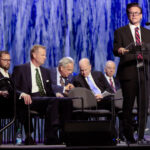 [1]
[1]February financial update with David Spika
NASHVILLE (BP) – David Spika, chief strategic investment officer for GuideStone Financial Resources, joined Jonathan Howe Monday (Feb. 8) to discuss the past month’s financial market news. They talk about GameStop, the Biden administration’s COVID stimulus plan, oil prices and much more.
Improving the quality of preaching is a necessity, Iorg says in spring convocation
By Tyler Sanders
ONTARIO, Calif. (BP) – In his spring 2021 convocation message, published digitally Feb. 3, Gateway President Jeff Iorg said pastors must be committed to persistently improving the quality of their preaching.
“In the midst of cultural upheaval, questions are rightly raised about how church leaders should respond,” he said. “The temptation and faulty assumption hinted at by the question is we need to do something new or different.”
Instead of a new solution, Iorg said the focus should be on doing “old things well.”
“One timeless strategy, needed right now, is declaring the Word of God: clearly, passionately, prophetically and tirelessly preaching the Gospel and its implication as detailed in the Bible,” Iorg said.
Preaching is the priority function of pastors and an indispensable element of worship in churches of a wide variety of theological lineages. It is vital to the ministry of the church and as a learnable skill, pastors must invest time in developing it.
Iorg described four ways contemporary pastors can improve their preaching. The first, and most important, way to assure strong preaching is to center it on the Bible. The biblical text must be the nucleus of the sermon, not just a casual reference. The preacher must thoroughly exegete the passage to determine the content, form and objective of the message. Then he must craft the sermon with the ultimate goal of personal transformation in hearers.
“We preach for life change: conversion for unbelievers; sanctification for believers,” he said.
“Good preaching proclaims conclusions emerging from the study of the text, but synthesized and delivered in a succinct way by a well-prepared preacher.”
Iorg said the second aspect of improving preaching, developing good application, is an even more crucial need among evangelicals. Good application is based on the biblical text and provides a specific plan of action that challenges hearers of the message to do something they can accomplish. A preacher must be connected to the needs of the people and spiritually guided to have the mind of Christ to deliver good application in a sermon. It requires “pastoral insight, spiritual discernment and personal courage,” Iorg said.
“Preaching is confrontational,” he said, “and insists on change.”
Hershel Shanks, who made biblical archaeology widely available, dies
By Yonat Shimron
(RNS) – He was not a household name, but in the sometimes arcane world of biblical archaeology, Hershel Shanks was a star, and often a rabble-rouser.
Shanks, the founder and longtime editor of Biblical Archaeology Review [4], died Feb. 5 at the age of 90.
After spending a yearlong sabbatical in Israel in 1972, Shanks, who was Jewish, fell in love with archaeology. Having discovered archaeology late in life, however, he subsequently devoted all his considerable energy to making the field accessible to nonscholars.
In 1975, he founded the Biblical Archaeology Review as a way to bridge academic scholarship with the lay public’s appetite for answers to questions about key archaeological and historical events from the Bible: Was the Jews’ exodus from Egypt a historical event? Which parts of Jesus’ life as recounted in the Gospels are historical and which parts apocryphal?
His biggest contribution may have been a decades-long advocacy for public access to the Dead Sea Scrolls, considered among the 20th century’s greatest archaeological finds. The scrolls, which were unearthed in 1947, became the purview of a key group of experts who controlled access to them.
But research into the scrolls held the promise of better understanding of Judaism in the decades before the birth of Jesus. Shanks, a journeyman journalist, understood this. In 1991, he announced the publication of 1,787 photographs of Dead Sea Scroll fragments never before seen outside of research libraries. He was sued for breach of copyright, a battle he lost.
He would go on to publish other archaeological scoops, often drawing the ire of professional archaeologists and academics who considered his tactics sensationalist.
Born in 1930 in Sharon, Pa., Shanks earned degrees from Haverford College, Columbia University and Harvard Law School. He then joined the U.S. Justice Department, where he handled cases in the United States Courts of Appeal and the Supreme Court. He practiced law privately in Washington for more than 25 years, writing widely in legal journals. He even argued an occasional case before the U.S. Supreme Court.
Then he made his trip to Israel. While there, he wrote a book, “The City of David: A Guide to Biblical Jerusalem [5].”
From 1987 to 2004, Shanks edited and published Moment [6], a magazine that bills itself as a Jewish take on news, ideas and culture.
Moment editor-in-chief and CEO Nadine Epstein called Shanks “a towering presence, a true force of nature” and said, “His legacy of opening up the field of Biblical archeology was a testament to his sense of justice and transformed not just Biblical archeology but the trajectory of both the Jewish and Christian worlds. He will be greatly missed.”
From Religion News Service, via The Associated Press. May not be republished.









